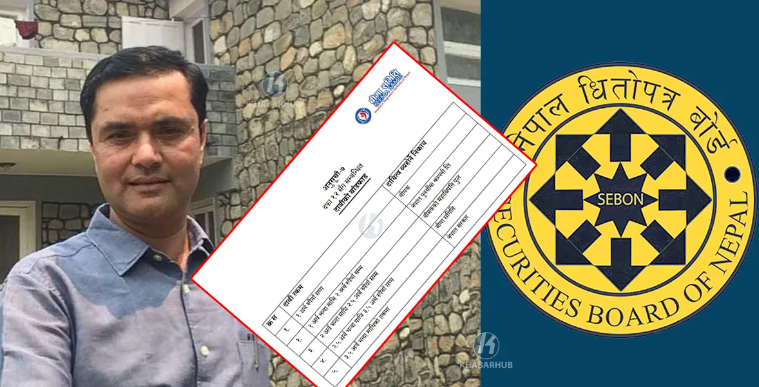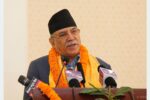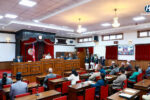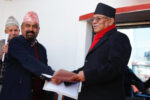KATHMANDU: Chiranjeevi Chapagain, the former Chairman of Beema Samiti (now Nepal Insurance Authority) known for scrutinizing Nepal’s insurance industry, is now eyeing the Executive Chairman position at the Securities Board of Nepal (SEBON).
Chapagain, whose tenure was marked by controversy due to the issuance of a Coronavirus insurance policy that incurred significant costs to the state, is pursuing the role of SEBON’s Executive Chairman.
The government, slated to appoint the SEBON Chairman on February 27, formed a 3-member committee comprising Meen Bahadur Shrestha, Krishna Hari Pushkar, and Uday Niraula.
This committee has already recommended five candidates, including Krishna Bahadur Karki, Chiranjeevi Chapagain, Navaraj Adhikari, Muktinath Shrestha, and Santosh Narayan Shrestha, based on professional action plans and educational qualifications.
Moreover, the standards outlined the formation of an agency responsible for processing Coronavirus insurance claims, along with a claim management sub-committee.
Among the recommended candidates, Chapagain stands out for his actions during the Corona pandemic, where he stirred controversy by challenging Nepal’s insurance practices.
Despite the alphabetical order of the published names, influential figures within business circles are reportedly lobbying key government officials, from the finance minister to the prime minister, to endorse Chapagain for the SEBON chairmanship.
Especially with the aim of introducing a new stock exchange and influencing the brokerage system, efforts are underway to exert pressure on the finance minister and the prime minister to advance Chapagain’s candidacy, despite his controversial background, in favor of certain business groups.
Despite the committee’s recommendation on April 7, the government has yet to make a decision on the matter.
As for the controversial policy issued by Chapagain, it pertains to the Coronavirus insurance scheme implemented during his tenure.
Under the budget for the fiscal year 2077/78 BS, then Finance Minister Yubaraj Khatiwada arranged for the insurance, subsidizing 50 percent of the collective insurance fee up to one lakh rupees and exempting government employees from the insurance fee altogether.
Subsequently, the Insurance Committee issued the Corona Insurance Standards, 2077, on July 19 of the same year.
These standards included provisions for issuing two types of Corona insurance policies, valued at 50 thousand and 1 lakh rupees respectively, as well as the establishment of an insurance fund.
Moreover, the standards outlined the formation of an agency responsible for processing Coronavirus insurance claims, along with a claim management sub-committee.
According to the criteria, payment of claims was to be handled by various entities depending on the claim amount: up to 1 billion rupees by the respective claim payment company, between 1 billion to 2 billion rupees by Nepal Reinsurance Company, between 2 billion to 2.5 billion rupees by devastation pool, and between 2.5 billion to 3.5 billion rupees by the Insurance Committee.
Investors are also concerned about potential political interference in the operations of Nepal’s stock market regulatory body, which boasts over six million Nepali members.
Additionally, it was stipulated that if the standard resulted in liabilities exceeding three and a half billion, the Nepal government would assume responsibility.
Insurance industry stakeholders have criticized the insurance committee for pushing forward the Corona insurance policy and burdening the state with controversial and seemingly unlimited liabilities.
“Corona insurance was essentially orchestrated by the insurance authority rather than the companies themselves,” explained an expert in the insurance sector on the condition of anonymity.
Contrary to claims of unlimited liability, insurance companies were supposed to establish limited liability entities, with the government assuming unlimited liability.
As noted by insurance experts, millions of policyholders with Corona-related insurance issued by the committee during the epidemic are yet to receive payouts.
According to the committee’s criteria, the government is obligated to pay over 10 billion rupees.
However, the government’s failure to meet this obligation is eroding trust in Nepal’s entire insurance sector.
During his tenure as chairman of the insurance committee, Chapagain, then Director of Nepal Rastra Bank’s Pokhara office, was appointed via political channels despite lacking insurance expertise.
Consequently, experts argue that policies, such as the Corona insurance scheme, were implemented without adequate knowledge.
Investors are also concerned about potential political interference in the operations of Nepal’s stock market regulatory body, which boasts over six million Nepali members.









Comment